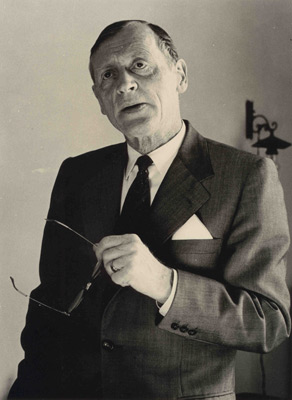Veljko Guberina was born on September 9, 1925. in Vrginmost (Kordun). Until 1941, he lived in Karlovac (Croatia), where he completed the Serbian elementary school Sveti Sava and five grades of grammar school. In July 1941, he and his family were forced to flee to Serbia – Jagodina, where he lived with his mother and sister during the occupation. In 1944. he finished grammar school in Jagodina and moved to Belgrade in the spring of 1945, where he was arrested on 28.8. 1945. and sentenced as a head of a group of nationalists to three years in prison. He served the sentence in the KPD Niš from where he was released in May 1947. He worked in Belgrade, where he lived with his mother. Since he could not enroll at the Faculty of Law in Belgrade, he graduated as an associate student in 1951. in Ljubljana.
After serving in the military service in 1953, he started working as a lawyer trainee with lawyer Milan Tadić and in the District Court in Belgrade.
He opened his law office in Belgrade in 1956.
As he was noted as hardworking and ambitious during his internship in the District Court, he began to receive defense ex officio in the field of youth delinquency.
At the beginning of 1959, he received the case that had entered in the court annals entitled as the “Case in train no. 116 “. Namely, the 19-year-old Rom was accused of having committed a serious theft on the train, an attempt to kill a police official and kill the passengers in an insidious manner. Three convicting verdicts were abolished by the Supreme Court of Serbia, in the fourth trial after five years of hard and persistent struggle, about which the press wrote a lot at the time, the Accused was released in March 1964.
Soon after that (1965) he participated in the so-called. “Farkaždin case”. As a defense counsel, after the second conviction of the Zrenjanin District Court, he demanded and the Supreme Court of Serbia granted the request and opened a hearing and examined witnesses whom the defense insisted on and eventually released the accused because there was no evidence that they had committed the criminal offense in question. This was the first time that the Supreme Court opened a hearing and held a trial before their trial chamber.
In both cases, publicity was great. Veljko Guberina became a famous and popular lawyer in the country. The cases that were the subject of public interest kept coming:
Točilovac (Belgrade, the case that had the highest publicity in the country after the trial of Draža Mihailović and Archbishop Stepinac), Gutić (Belgrade, Execution), Despotov (Zrenjanin Jack trbosek), Murder in the courtroom (Bijelo Polje), Gavra (Novi Sad), One day to life (Zajecar), The tragedy of a Kordunaš (Jagodina), Murder in Genoa (Titograd), Crime and Punishment of Milun (Novi Pazar), Murder because of a “Fića” (Belgrade), Toma Kostrec (Zagreb), Poor Ćaili (Skopje), A classic case of a passion crime murder (Split), Tragedy of Meliha (Zenica), Dobojan Rashomon (Doboj), Čeda Rezić (Ljubljana), Is the taking of a lawyer proof of guilt (Priština, a unique case in our judiciary system), The victory turned into a defeat (Gnjilane), The ordered murder from Zurich (Karlovac), The first case of international terrorism – the murder of the Turkish ambassador in Belgrade (Belgrade), The case of Šalinac (Smederevo) – five years of heavy fighting – was acquitted because it was established that the testimony in the investigation was “not obtained in a lawful manner”, the case of “131 stabbings” (Belgrade), Spider (Belgrade), etc.
He acted as a defense attorney at The Hague Tribunal in 1996. in the Kremenović case who was extradited to the Hague from custody in Novi Sad on the request of the Prosecution, but already in June 1996, he was returned to the country to be tried in Novi Sad, where the proceedings were suspended.
Known as a fighter against the death penalty, he was one of the founders of the Association for the Fight against the Death Penalty in 1981, which association was not approved at the time.
During his career he defended 618 people charged with murder. There were 42 death sentences, of which ten defendants were shot. He had 47 acquittals due to his appearance in court and especially his closing arguments.
By his appearance in court he contributed to the Criminal Procedure Act of January 1, 1968. to be amended with the Art. 66. “The accused has the right to a defense counsel during the entire criminal proceedings”.
After the process in the case of Točilovac, two new articles were entered into the CPC: Art. 84. and Art. 85. which improved the position of the accused.
As a member of the Human Rights Forum, where he acted as a representative of the lawyers of Serbia and Yugoslavia, Guberina contributed to the abolition of verbal delict.
In addition to such an intense appearances before the courts, he managed to devote much of his time to his profession, working in the organs of the bar, starting with the president of the Second Self-Governing Community of Lawyers in Belgrade, in order to be elected as a member of the Presidency of the Bar Association of Serbia. He was twice President of the Bar Association of Serbia (1984-1986 and 1988-1990), and in 1985 he was President of the Association of Bar Associations of Yugoslavia. In that position he raised his voice on behalf of the lawyers of Serbia and Yugoslavia against violations of legality and legal certainty, which spilled over both Croatia and Kosovo and Metohija. Our public was familiar with all these letters addressed to the leaders of Serbia and Yugoslavia.
In order to work on the affirmation of the lawyer and their reputation, he received the Plaque of the Bar Association of Serbia in 1981, and in 1987 the Charter of the Bar Association of Serbia. He also received the Charter of the Alliance of Bar Associations of Yugoslavia in 1990 for a special contribution to the development of legal profession throughout the territory of Yugoslavia (on the occasion of the 60th anniversary of the Alliance of Bar Associations of Yugoslavia). He also received the Thanksgiving Award in 1992.
When the democratization of society and multiparty system came in 1990, he did not leave the legal profession, but he committed to politics and became the president of the People’s Radical Party. In February 1991, he stopped his engagements in politics and continued his work as a lawyer.
On his proposal in 1993, the Bar Association of Serbia formed a committee with the task of carrying out the evocation of one big lawyer every year. The following evocations were held: Fila, Subotić, Tasić, Kovacević, Đonović, Joksimović, Strugar, Dukanac, Vojvodić, and Dr Janko Baričević (Cacak).
He was the initiator and co-author, in 1995, in the development of the History of the Yugoslav Advocates (in three volumes). Thus he achieved his principle: “The creative work that leaves something behind fulfills the purpose of our lives.”
He also worked as a publicist and, during 1977, 1980, 1983, 1995 and 1999, he wrote five books entitled “I Defended …” (Branio sam) in which he cited cases that aroused public interest and as a lesson to future generations in the judiciary.
As a human rights activist, he published two books “As I said” (To sam rekao) (1991 and 1993) and in 1997 “Reactions” (Reagovanja).
He published nine books under the title “Witness of History” (Svedok istorije) in which he described the time, events and the human basis of the Diary that has been in existence since 1940.
He was the initiator is also the co-author of the “History of the Serbian Advocates”, a work done for the occasion of the 150 years of the existence of the lawyer profession in Serbia.
Veljko Guberina is a bearer of the Order of St. Save I degree received in 1997 by the Holy Sinode of the Serbian Orthodox Church.
Since 1993, when the competition in fine speech was renewed at the Faculty of Law in Belgrade, he was a member of the jury. He gave a prize to a winner in the “improvisation” category. Since 1996, he has been a member of the jury at the Law Faculty in Nis, and for several years in the Paralegal School in Belgrade. Everywhere he awarded his prize for improvisation.
On the occasion of the celebration of the 140th anniversary of the Serbian legal profession in 2002, he was decorated with the Order of Labor by the President of the Republic.
On 25.7.2004. he awarded the Plaque of the Municipality of Jagodina.
From the literary club Đuro Jakšić from Jagodina he received the literary award “Živojin Pavlović” (2007) for the book “Witness of History” as the best book of prose of writers who had been linked to this city with their life and work.
On the occasion of 80 years of life and 50 years of work in the attorney’s office, Belgrade Bar Association organized a conference in his honor.
By the decision of the District Court in Belgrade on 27.4.2009. on a request made for his rehabilitation, judgment from 1946 on which he was convicted was announced null and void.
The Board of Directors of the Bar Association of Serbia on 8.9.2012. awarded Veljko Guberina a Golden Plaque for his contribution to the advancement of the law profession and its affirmation in public. This decision of the Bar association explained: “Through his engagement throughout the professional work, Guberina contributed to the improvement of the work of the organs of the Bar Association and initiated several important activities in the Chamber that resulted in the amendment of regulations, protection of human and civil rights and the introduction of rules into criminal proceedings which enabled better protection of defendants and defense lawyers during the entire criminal proceedings. ”

